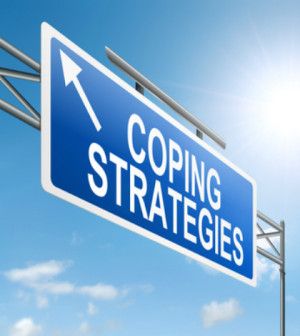Caregiver Stress and the Need for Stress Management
Caregiver stress is a chronic condition that can have serious consequences on both mental and physical health. Learn about the physiological effects of stress and how to manage it as a caregiver for a loved one with dementia.

Stress Management and Caregiver Stress
If you’re like many people with caregiver stress, it means you’re either… the adult child or the spouse, caring for a family member. And like many other people in your position you probably worry… “What happens if I get sick and can’t provide for my mom/dad.” For many people stress plays a large part in maintaining your health.
Caregiver Stress Is Chronic Stress
First, let’s look at chronic stress. Caregiver stress, is considered chronic stress. Because it’s the result of constant exposure to circumstances and conditions… often beyond your control that cause a hyper-alert state. You’re frequently dealing with unpredictable and/or volatile situations and irrational behavior.
To compound the problem you … are often without reliable recourse that is dependable and consistent.
Living under such difficult, emotional pressure has long-term effects on your mental health. But it also has bearing on your physical health. In fact, the past 20 years of research shows… that people who suffer from chronic stress… are at much greater risk for heart attacks, strokes, and even cancer than others in their age bracket.
In fact, according to some, 50% of caregivers die before the person they are caring for dies. Caregivers of a family member with dementia, statistics are at 63%. It’s theorized that chronic stress… weakens the physical body. And dampens the immune system. It is the main culprit for this high mortality rate.

What Happens Physically During Caregiver Stress?
First realize that stress is not an emotional state. It is a physiological reaction that occurs in your body. Doctors refer to it as the hypothalamic pituitary axis. The connection between the …hypothalamus, pituitary and the adrenal gland. These three ‘elements’ work together during a stressful event. This puts the body into a heightened state of preparation.. to overcome a potentially life threatening event.
This stress reaction is actually … a left over from a survival mechanism called, “Fight or Flight.” When faced with tremendous stress… where survival might hang in the balance… Humans have one of two instant reactions. Run from the situation (flight) or meet the challenge head-on (fight).
How a person reacts will differ from one to the next. But the thing that is consistent between them … is the hypothalamic pituitary axis (HPA) itself.
Everyone under stress has the HPA system, which regulates:
- Blood Pressure
- Heart Rate
- Body Temperature
- Blood Circulation
- Adrenaline
- Among many other activities
When stress becomes great, the HPA system takes over. And in a matter of seconds… blood circulation is diverted from the extremities to internal organs.
Adrenaline is secreted in massive amounts for instant energy. The adrenal gland starts producing and releasing steroid hormones. Including the primary stress hormone, cortisol. This hormone travels to all areas of the body including… the heart, lungs, circulation, metabolism, immune systems and skin.
For example, if a bear in the wild (or a thug on a street city corner) attacks you… then this HPA system can literally be a lifesaver.
Call it survival instinct if you will. But understand that this is a physiological reaction, not an emotional reaction. Just like your eyes dilating in a dark theatre, or salivating when you are hungry and smell food.
But here’s the problem as it relates to those caring for someone with dementia caregiver stress…
When stress becomes routine and you are constantly in state of hyper vigilance… reacting to your care-receiver wandering away from home… burning food on the stove… any number of other small crisis’s… this causes a constant biochemical release that, over time, actually harms the body.
Medical science says …. That having all these ‘stress’ hormones and neurotransmitters in your blood stream… too frequently will over time cause serious, sometimes permanent damage to your body.
Research consistently shows that individuals with chronic stress have adverse consequences like:
- Decreased immune system
- Greater chance for infection and disease
- Digestive tract problems like ulcers
- Lung problems like asthma
- Heart disease, which causes strokes and heart attacks
The HPA system is an intelligent design within the human race. The problem is it… doesn’t automatically distinguish caregiver stress that is continuous… day after day, from a bear attack. A bear attack is rare. That means that the stress that caregivers endure is chronic. And, more debilitating to the human body. But don’t despair; the good news is there are ways to combat its effects.
Stress Management
How Does Stress Management Help with Alzheimer caregiver stress? Good question! And that’s the main purpose of this website. Because caregiver stress is unavoidable. But what we can do is minimize it as much as possible. There are two ways to do that:
- Seek out and learn about as many services, programs and products as possible. Armed and educated… we can choose the ones that will save us money, or save us work, or help us be better at what we do for our loved one.
- Find ways to lessen our remaining stress, turn off that HPA system, enjoy life, and find better ways to cope.

Proven relaxation techniques include:
- Guided Imagery
- Meditation & Prayer
- Utilizing Adult Day Care
- Asking Friends and Relatives for help
- Listening to Music
- Going to the Movies
- Humor
- Massage Therapy
- Going for a Walk
- Exercise
The bottom line is simple…if you don’t accept help or address your stress your HPA system will tear down your body.
With 50% of all caregivers dying before those they care for, die… it’s important that as caregivers you make sure that care includes yourself too.
If you end up as one of the 50%… you won’t be there for your loved one; therefore defeating your original commitment to your loved one. So always take some time to focus on you.
That’s why at caregiverrelief.com … you will find guided imagery recordings… prayers, inspirational quotes and links to other sites that are humorous or relaxing.
They’re all designed to help you – the caregiver. But most of all, for lasting results, we recommend guided imagery.
Caregiver Guided Imagery for Relaxation
But be sure to visit our other pages, as well. You’ll find options for hands-on training … and guidance in relieving your Alzheimer caregiver stress.
Read how our caregiver support group lost several caregivers to chronic stress
You might also like this article:

